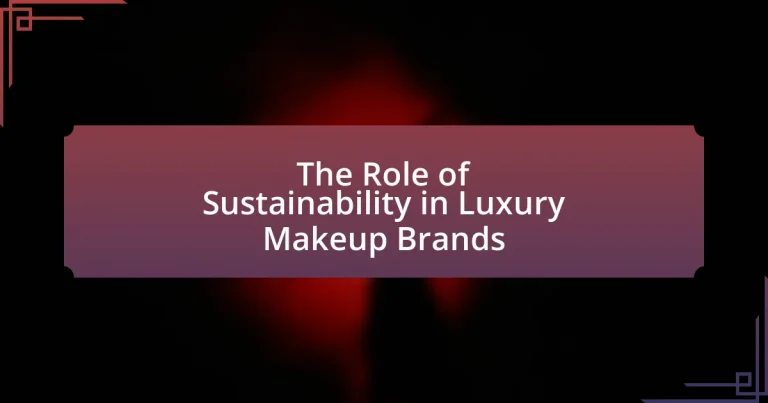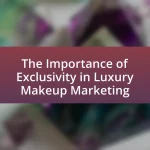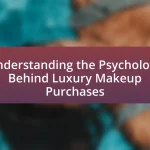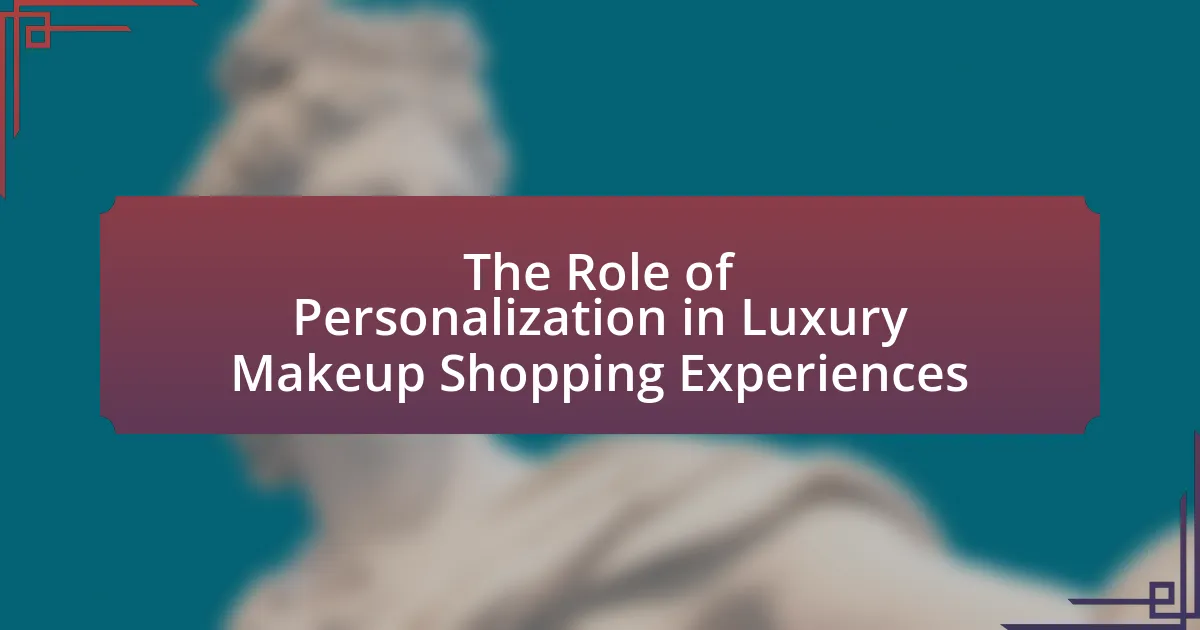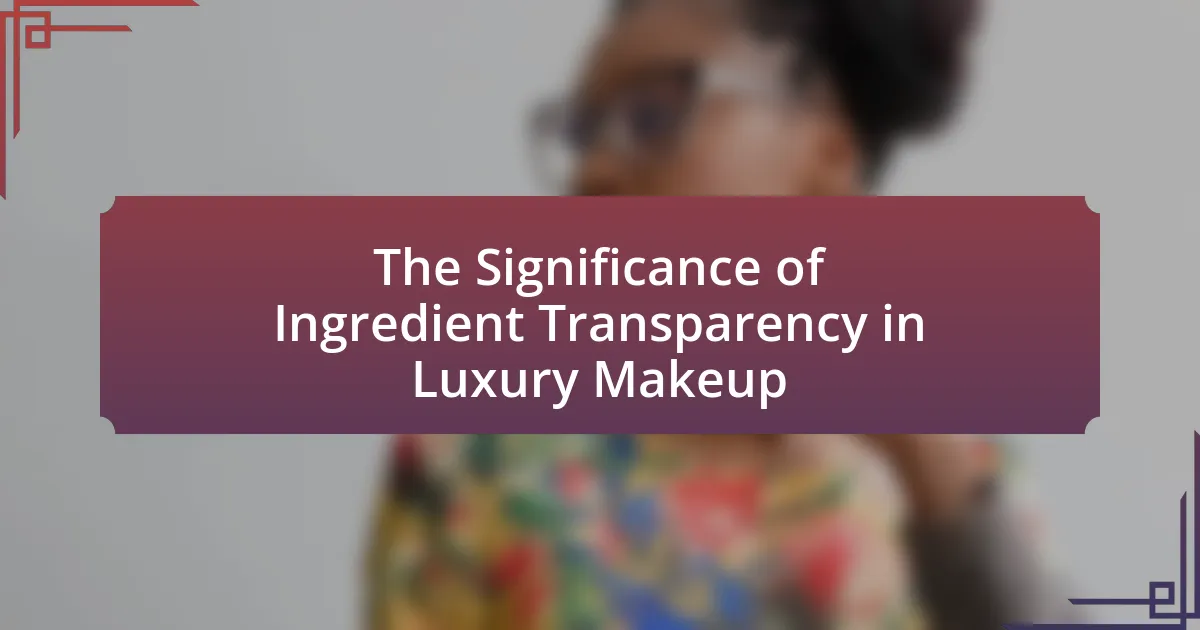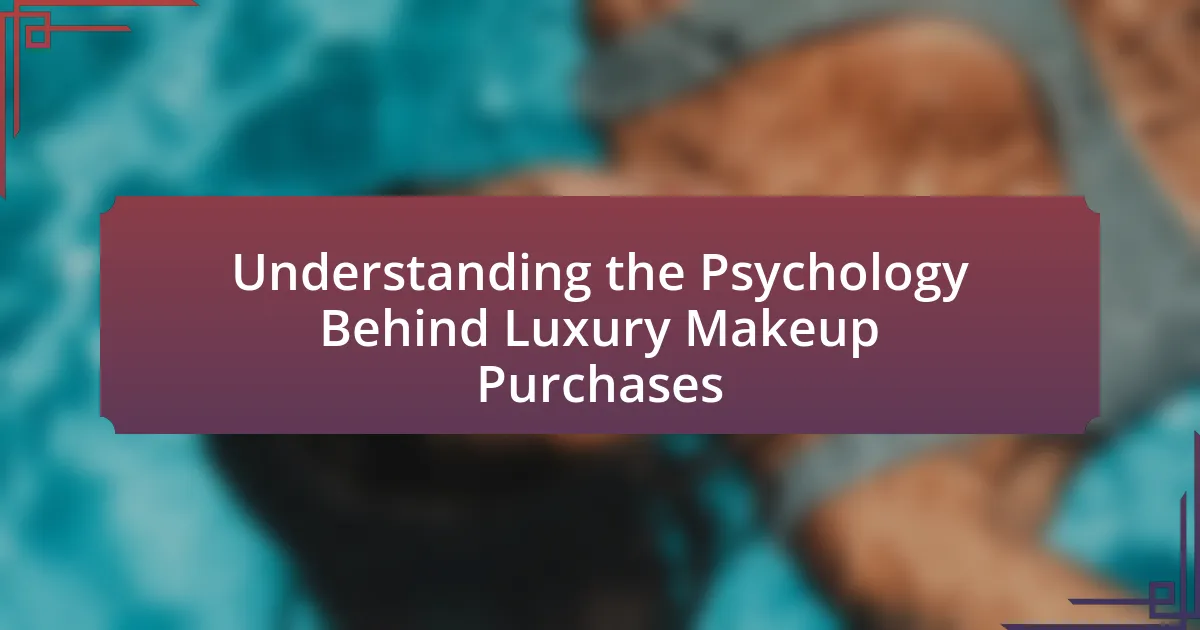The article examines the critical role of sustainability in luxury makeup brands, highlighting their commitment to environmentally and socially responsible practices. It discusses how brands like Gucci and Dior are adopting sustainable sourcing, eco-friendly packaging, and ethical production methods to meet the growing consumer demand for responsible products. Key principles of sustainability relevant to the beauty industry, such as waste reduction and transparency, are outlined, along with the challenges luxury brands face in implementing these practices. The article also explores consumer trends driving demand for sustainability, the impact on brand reputation and customer loyalty, and future trends in sustainable practices within the luxury makeup sector.
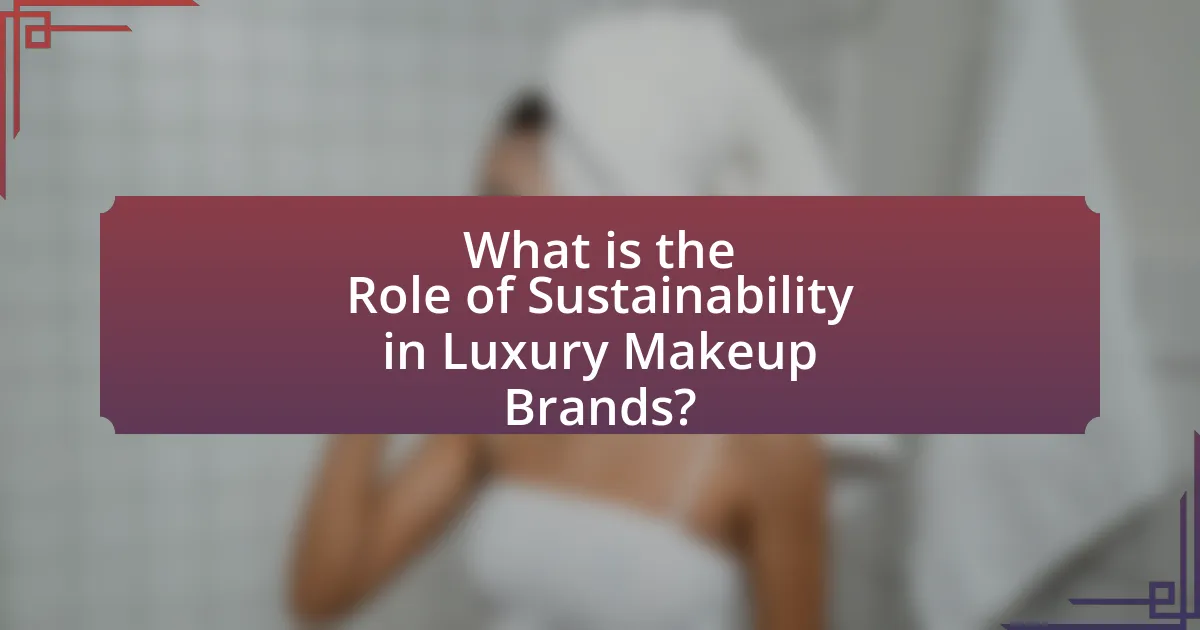
What is the Role of Sustainability in Luxury Makeup Brands?
Sustainability plays a crucial role in luxury makeup brands by aligning their practices with environmental and social responsibility. Luxury makeup brands are increasingly adopting sustainable sourcing, eco-friendly packaging, and ethical production methods to meet consumer demand for responsible products. For instance, brands like Gucci Beauty and Dior have committed to using sustainable ingredients and reducing carbon footprints, reflecting a broader industry trend towards sustainability. This shift is supported by research indicating that 66% of global consumers are willing to pay more for sustainable brands, highlighting the market’s growing preference for eco-conscious luxury products.
How is sustainability defined within the context of luxury makeup brands?
Sustainability within the context of luxury makeup brands is defined as the commitment to environmentally and socially responsible practices throughout the product lifecycle, from sourcing ingredients to packaging and distribution. Luxury makeup brands increasingly prioritize sustainable sourcing of raw materials, such as using organic or ethically sourced ingredients, and implementing eco-friendly packaging solutions to reduce waste. For instance, brands like Dior and Gucci have adopted initiatives to minimize their carbon footprint and enhance transparency in their supply chains, reflecting a growing consumer demand for ethical luxury. This shift is supported by research indicating that 66% of global consumers are willing to pay more for sustainable brands, highlighting the importance of sustainability in maintaining brand loyalty and market competitiveness.
What are the key principles of sustainability relevant to the beauty industry?
The key principles of sustainability relevant to the beauty industry include eco-friendly sourcing, waste reduction, ethical production, and transparency. Eco-friendly sourcing emphasizes the use of renewable resources and biodegradable ingredients, which minimizes environmental impact. Waste reduction focuses on minimizing packaging waste through recyclable or refillable options, as seen in brands like Lush, which has implemented a “naked” product line. Ethical production involves fair labor practices and cruelty-free testing, ensuring that products are made responsibly. Transparency requires brands to disclose ingredient sourcing and manufacturing processes, fostering consumer trust and informed choices. These principles collectively contribute to a more sustainable beauty industry, aligning with growing consumer demand for responsible practices.
How do luxury makeup brands interpret sustainability differently from mass-market brands?
Luxury makeup brands interpret sustainability as a holistic commitment to ethical sourcing, premium quality, and long-term environmental impact, contrasting with mass-market brands that often prioritize cost-effectiveness and rapid production. Luxury brands typically emphasize the use of high-quality, sustainably sourced ingredients, often highlighting their commitment to artisanal craftsmanship and minimal environmental footprint. For instance, brands like Chanel and Dior have invested in sustainable practices such as eco-friendly packaging and responsible ingredient sourcing, reflecting a deeper integration of sustainability into their brand ethos. In contrast, mass-market brands may adopt superficial sustainability measures, such as limited-edition eco-friendly packaging, without fundamentally altering their production processes or ingredient sourcing. This difference is evident in the luxury sector’s focus on transparency and traceability in their supply chains, which is less emphasized in mass-market brands.
Why is sustainability becoming essential for luxury makeup brands?
Sustainability is becoming essential for luxury makeup brands due to increasing consumer demand for environmentally responsible products. Research indicates that 66% of global consumers are willing to pay more for sustainable brands, highlighting a significant market shift towards eco-conscious purchasing. Additionally, luxury brands face pressure to align with sustainability goals set by international agreements, such as the Paris Agreement, which aims to reduce carbon emissions and promote sustainable practices. This alignment not only enhances brand reputation but also attracts a growing demographic of environmentally aware consumers, making sustainability a critical component of business strategy in the luxury makeup sector.
What consumer trends are driving the demand for sustainable practices?
Consumer trends driving the demand for sustainable practices include increasing awareness of environmental issues, a preference for ethical sourcing, and the desire for transparency in product ingredients. Research indicates that 66% of global consumers are willing to pay more for sustainable brands, reflecting a shift towards eco-conscious purchasing behaviors. Additionally, millennials and Gen Z consumers prioritize sustainability, with 73% of millennials stating they would pay extra for sustainable offerings. This trend is further supported by the rise of social media, where consumers actively seek brands that align with their values, amplifying the demand for sustainable practices in luxury makeup brands.
How does sustainability impact brand reputation and customer loyalty?
Sustainability significantly enhances brand reputation and customer loyalty by aligning with consumer values and expectations. Brands that prioritize sustainable practices are perceived as more responsible and trustworthy, which fosters a positive image. For instance, a 2021 survey by McKinsey found that 67% of consumers consider sustainability when making purchasing decisions, indicating a strong correlation between sustainable practices and customer loyalty. Furthermore, luxury makeup brands that adopt eco-friendly packaging and ethical sourcing can differentiate themselves in a competitive market, leading to increased customer retention and advocacy.
What challenges do luxury makeup brands face in implementing sustainable practices?
Luxury makeup brands face significant challenges in implementing sustainable practices, primarily due to high production costs and consumer expectations for premium quality. The transition to sustainable materials often requires substantial investment in research and development, which can increase the overall cost of products. Additionally, luxury consumers typically expect high-performance products, making it difficult for brands to balance sustainability with efficacy. According to a 2021 report by McKinsey & Company, 66% of consumers are willing to pay more for sustainable products, yet luxury brands must still navigate the complexities of sourcing eco-friendly ingredients and packaging while maintaining their brand image. This dual pressure complicates the integration of sustainable practices into their business models.
What are the common obstacles in sourcing sustainable ingredients?
Common obstacles in sourcing sustainable ingredients include limited availability, higher costs, and inconsistent quality. Limited availability arises because sustainable farming practices often yield lower quantities compared to conventional methods, making it difficult for brands to secure enough supply. Higher costs are associated with sustainable sourcing due to the investment required for ethical farming practices and certifications, which can lead to increased prices for consumers. Inconsistent quality can occur as sustainable ingredients may vary in performance and characteristics, complicating formulation processes for luxury makeup brands. These challenges hinder the ability of brands to fully commit to sustainability while maintaining product standards and profitability.
How do luxury brands balance sustainability with maintaining exclusivity and quality?
Luxury brands balance sustainability with maintaining exclusivity and quality by integrating eco-friendly practices into their production processes while preserving high standards of craftsmanship. For instance, brands like Gucci and Stella McCartney utilize sustainable materials such as organic cotton and recycled polyester, ensuring that their products remain luxurious and exclusive. Additionally, luxury brands often limit their production runs to maintain scarcity, which enhances exclusivity while adopting sustainable practices, such as reducing waste and carbon footprints. This approach not only aligns with consumer demand for ethical products but also reinforces the brand’s commitment to quality, as seen in the increasing use of artisanal techniques that emphasize both sustainability and superior craftsmanship.
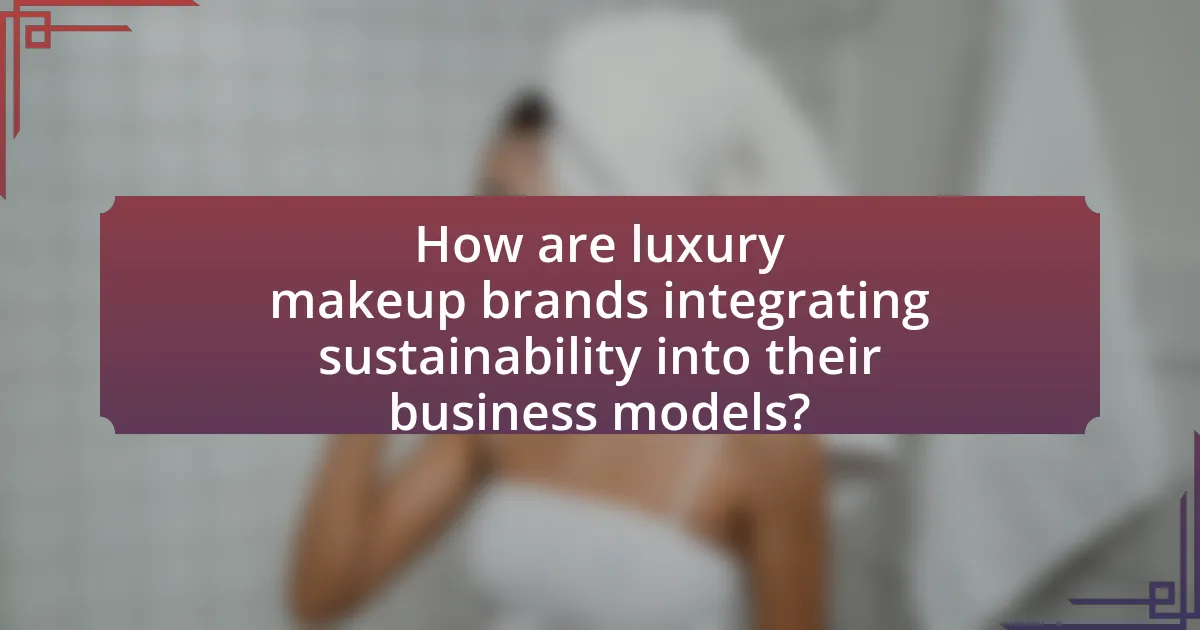
How are luxury makeup brands integrating sustainability into their business models?
Luxury makeup brands are integrating sustainability into their business models by adopting eco-friendly practices, utilizing sustainable materials, and promoting ethical sourcing. For instance, brands like Gucci Beauty and Dior have committed to reducing their carbon footprints by implementing refillable packaging and using biodegradable materials. According to a report by McKinsey & Company, 67% of consumers consider sustainability when making luxury purchases, prompting brands to prioritize transparency in their supply chains and invest in renewable energy sources. This shift not only aligns with consumer demand but also enhances brand loyalty and market competitiveness.
What strategies are luxury makeup brands using to promote sustainability?
Luxury makeup brands are employing several strategies to promote sustainability, including the use of eco-friendly packaging, sourcing ethically produced ingredients, and implementing refillable product systems. For instance, brands like Chanel and Dior have introduced recyclable and biodegradable packaging to minimize environmental impact. Additionally, many luxury brands are prioritizing the use of sustainably sourced ingredients, such as organic botanicals, to reduce their carbon footprint. Furthermore, refillable systems, as seen with brands like Gucci and YSL, encourage consumers to reuse packaging, thereby decreasing waste. These strategies reflect a growing commitment within the luxury makeup sector to align with sustainable practices and consumer expectations.
How are brands innovating in packaging to reduce environmental impact?
Brands are innovating in packaging to reduce environmental impact by utilizing sustainable materials, implementing refillable systems, and adopting minimalist designs. For instance, many luxury makeup brands are shifting to biodegradable or recyclable materials, such as glass and plant-based plastics, which significantly lower waste. Additionally, brands like Fenty Beauty and Kjaer Weis have introduced refillable packaging options, allowing consumers to reuse containers and minimize single-use waste. Furthermore, minimalist packaging designs reduce material usage and energy consumption during production. These strategies collectively contribute to a more sustainable approach in the beauty industry, aligning with consumer demand for eco-friendly practices.
What role does transparency play in sustainable luxury makeup brands?
Transparency is crucial for sustainable luxury makeup brands as it builds consumer trust and accountability. By openly sharing information about sourcing, production processes, and ingredient safety, these brands demonstrate their commitment to ethical practices. For instance, a study by the Ethical Consumer Research Association found that 88% of consumers are more likely to purchase from brands that are transparent about their supply chains. This level of openness not only enhances brand loyalty but also encourages industry-wide standards for sustainability, as consumers increasingly demand responsible practices.
How do luxury makeup brands measure their sustainability efforts?
Luxury makeup brands measure their sustainability efforts through various metrics, including carbon footprint assessments, sustainable sourcing of ingredients, and packaging innovations. These brands often utilize life cycle assessments (LCAs) to evaluate the environmental impact of their products from production to disposal. For instance, brands may track the percentage of renewable materials used in packaging or the reduction of greenhouse gas emissions during manufacturing processes. Additionally, many luxury brands report their sustainability initiatives through third-party certifications, such as the Carbon Trust Standard or the Forest Stewardship Council, which provide credible validation of their claims. This structured approach allows luxury makeup brands to quantify their sustainability efforts and communicate their progress transparently to consumers.
What metrics are used to assess sustainability in product development?
Metrics used to assess sustainability in product development include life cycle assessment (LCA), carbon footprint, water usage, and material sourcing. Life cycle assessment evaluates the environmental impacts of a product from raw material extraction to disposal, providing a comprehensive view of sustainability. The carbon footprint measures greenhouse gas emissions associated with a product, while water usage quantifies the amount of water consumed during production. Material sourcing metrics assess the sustainability of raw materials, focusing on renewable resources and ethical practices. These metrics are essential for luxury makeup brands to align with consumer expectations and regulatory standards regarding sustainability.
How do brands report their sustainability progress to consumers?
Brands report their sustainability progress to consumers through various methods, including sustainability reports, social media updates, and product labeling. Sustainability reports provide detailed insights into a brand’s environmental impact, initiatives, and goals, often published annually to maintain transparency. Social media platforms allow brands to share real-time updates and engage with consumers about their sustainability efforts, fostering a community around eco-conscious practices. Additionally, product labeling, such as certifications from recognized organizations, helps consumers easily identify sustainable products, reinforcing the brand’s commitment to sustainability. For instance, brands like L’Oréal and Estée Lauder publish comprehensive sustainability reports that outline their progress and future targets, demonstrating accountability and encouraging consumer trust.
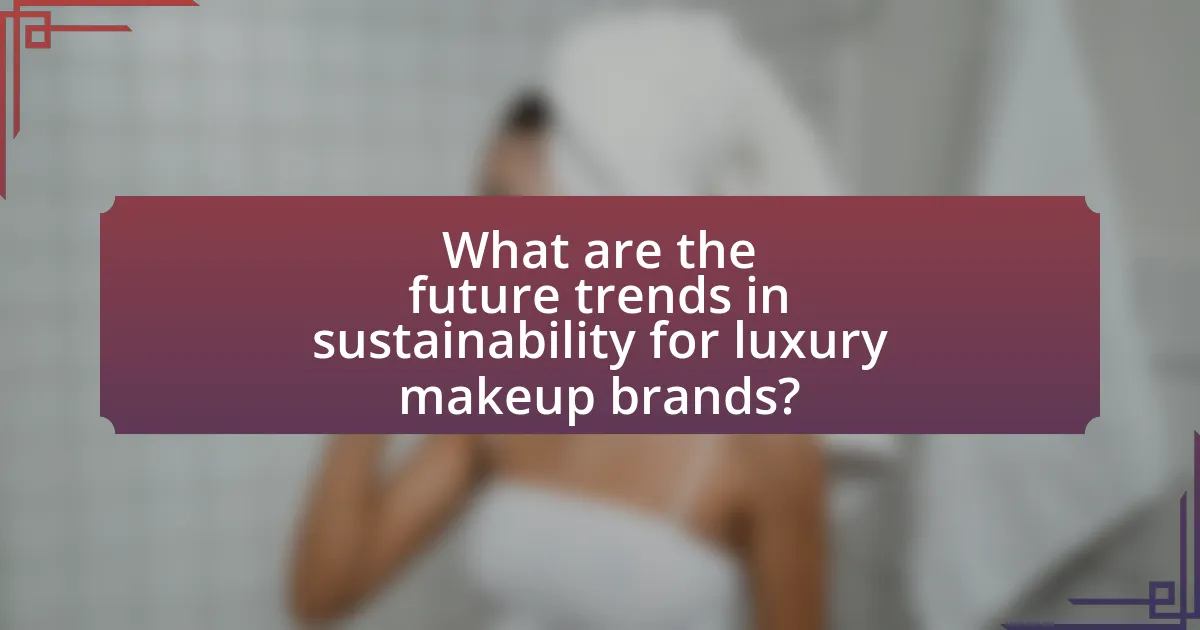
What are the future trends in sustainability for luxury makeup brands?
Future trends in sustainability for luxury makeup brands include increased use of biodegradable packaging, the adoption of clean and natural ingredients, and a focus on ethical sourcing. Biodegradable packaging is gaining traction as brands aim to reduce plastic waste; for instance, brands like Lush have already implemented this approach. The shift towards clean and natural ingredients is driven by consumer demand for transparency and safety, with studies indicating that 70% of consumers prefer products with fewer synthetic chemicals. Additionally, ethical sourcing practices are becoming essential, as brands like Gucci and Dior are committing to sustainable supply chains, reflecting a broader industry movement towards responsible production.
How is technology influencing sustainability in the luxury makeup sector?
Technology is significantly influencing sustainability in the luxury makeup sector by enabling the development of eco-friendly formulations and sustainable packaging solutions. Innovations such as biotechnology allow brands to create products using renewable resources, reducing reliance on synthetic chemicals. For instance, companies like L’Oréal have invested in bio-based ingredients derived from plants, which minimizes environmental impact. Additionally, advancements in packaging technology, such as the use of biodegradable materials and refillable containers, help decrease waste. According to a report by McKinsey & Company, 67% of consumers in the luxury sector are willing to pay more for sustainable products, highlighting the market demand for these technological advancements.
What innovations are emerging in sustainable ingredient sourcing?
Innovations in sustainable ingredient sourcing include the development of lab-grown ingredients, which reduce the environmental impact associated with traditional farming. For instance, companies are now utilizing biotechnology to create sustainable alternatives to animal-derived ingredients, significantly lowering carbon footprints and resource consumption. Additionally, advancements in regenerative agriculture practices are being adopted, which enhance soil health and biodiversity while ensuring a sustainable supply of raw materials. Research indicates that these methods can increase crop yields by up to 20% while reducing the need for chemical fertilizers and pesticides, thereby promoting a more sustainable ecosystem.
How are digital platforms shaping consumer engagement with sustainable brands?
Digital platforms are significantly enhancing consumer engagement with sustainable brands by facilitating direct communication and fostering community around shared values. These platforms enable brands to showcase their sustainability efforts transparently, allowing consumers to access detailed information about sourcing, production processes, and environmental impact. For instance, a study by Nielsen found that 66% of global consumers are willing to pay more for sustainable brands, indicating a strong market demand that digital platforms can capitalize on by promoting eco-friendly practices. Additionally, social media channels allow consumers to share their experiences and opinions, creating a sense of community and encouraging brand loyalty among those who prioritize sustainability.
What best practices can luxury makeup brands adopt for sustainable growth?
Luxury makeup brands can adopt best practices for sustainable growth by integrating eco-friendly ingredients, utilizing sustainable packaging, and promoting ethical sourcing. By prioritizing natural and organic components, brands can reduce their environmental impact and appeal to environmentally conscious consumers. For instance, brands like Fenty Beauty have embraced clean beauty by offering products free from harmful chemicals. Additionally, implementing recyclable or biodegradable packaging can significantly decrease waste; brands such as Lush have successfully adopted this approach, enhancing their sustainability credentials. Furthermore, ethical sourcing of materials, such as fair-trade ingredients, not only supports local communities but also aligns with consumer demand for transparency and responsibility in the supply chain. According to a report by McKinsey & Company, 67% of consumers consider sustainability when making purchasing decisions, highlighting the importance of these practices for long-term growth in the luxury makeup sector.
How can brands effectively communicate their sustainability initiatives to consumers?
Brands can effectively communicate their sustainability initiatives to consumers by utilizing transparent messaging and engaging storytelling. Transparency involves clearly outlining the specific actions taken towards sustainability, such as sourcing materials responsibly or reducing carbon footprints. For instance, a study by Nielsen found that 66% of global consumers are willing to pay more for sustainable brands, indicating that clear communication of sustainability efforts can enhance consumer trust and loyalty. Engaging storytelling can further connect consumers emotionally to the brand’s mission, making the initiatives relatable and memorable. Brands like L’Oréal have successfully implemented these strategies by sharing detailed reports on their sustainability goals and progress, thereby reinforcing their commitment to environmental responsibility.
What partnerships can enhance sustainability efforts in the luxury makeup industry?
Collaborations with sustainable ingredient suppliers and eco-friendly packaging companies can significantly enhance sustainability efforts in the luxury makeup industry. By partnering with suppliers that prioritize organic, ethically sourced materials, luxury brands can reduce their environmental impact and promote responsible consumption. For instance, brands like L’Oréal have engaged with sustainable ingredient suppliers to ensure that their formulations are not only effective but also environmentally friendly. Additionally, alliances with packaging innovators focused on biodegradable or recyclable materials can help luxury makeup brands minimize waste. A notable example is the partnership between Estée Lauder and the recycling company TerraCycle, which aims to create a circular economy for beauty products. These strategic partnerships not only improve sustainability practices but also resonate with increasingly eco-conscious consumers, thereby enhancing brand loyalty and market competitiveness.
